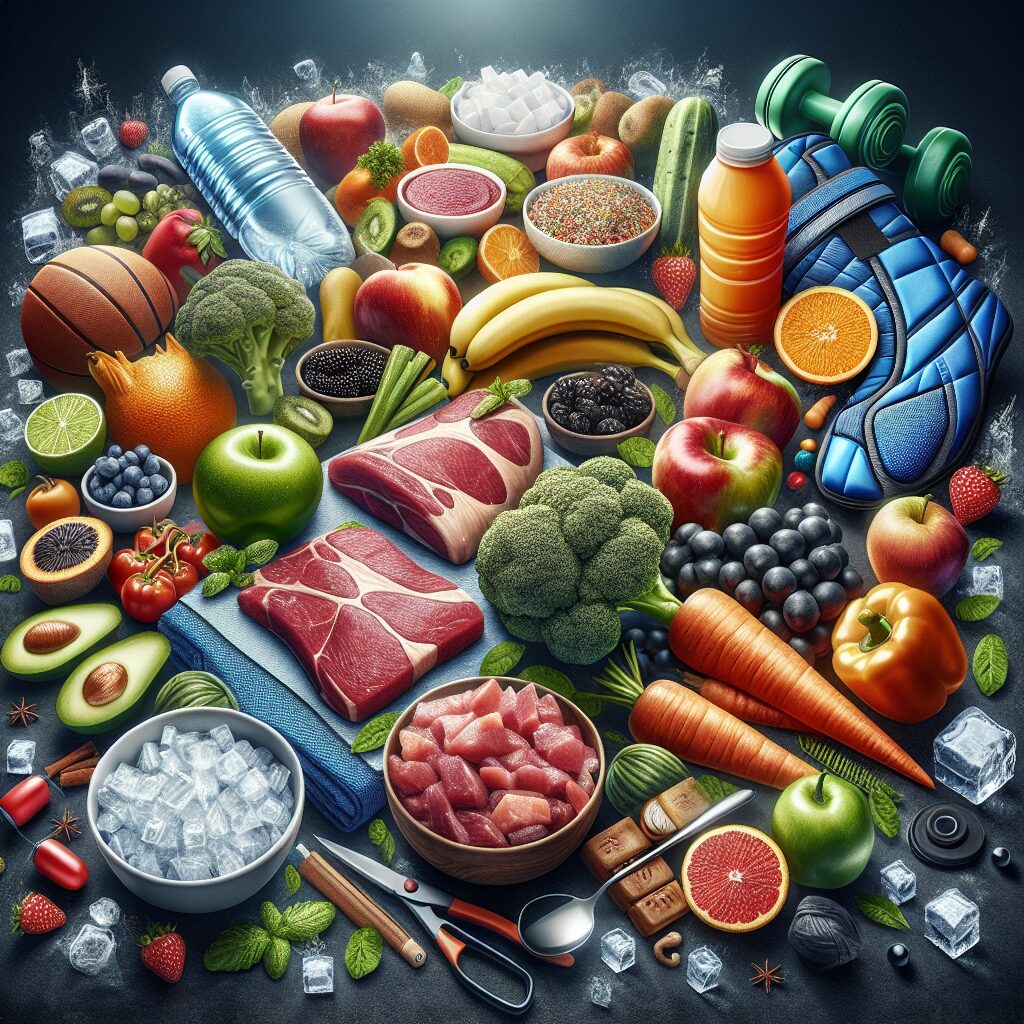Nutrition and injury prevention go hand in hand when it comes to achieving success in any physical activity. Whether you are an athlete, a fitness enthusiast, or simply someone who wants to lead a healthier lifestyle, fueling your body with the right nutrients is essential for preventing injuries and maximizing performance.
Proper nutrition plays a crucial role in injury prevention by providing the necessary building blocks for strong muscles, bones, and connective tissues. A well-balanced diet rich in vitamins, minerals, and antioxidants helps to strengthen the immune system, reduce inflammation, and promote faster recovery from injuries. Additionally, adequate intake of macronutrients such as carbohydrates, proteins, and healthy fats ensures optimal energy levels, enhances muscle growth and repair, and improves overall endurance.
In the next part of this article, we will explore some key takeaways on how to incorporate nutrition strategies into your routine for injury prevention. We will discuss the importance of hydration, the role of specific nutrients in preventing injuries, and practical tips for pre- and post-workout fueling. So, let’s dive in and discover how you can fuel for success and protect your body from injuries!
Key Takeaways
1. Proper nutrition plays a crucial role in injury prevention by providing the necessary energy, nutrients, and antioxidants to support optimal athletic performance and recovery.
2. Consuming an adequate amount of carbohydrates is essential for fueling high-intensity activities, as they provide readily available energy for muscles and help delay fatigue.
3. Protein intake is important for muscle repair and growth, and athletes should aim for a balanced consumption throughout the day, including protein-rich meals and snacks after workouts.
4. Hydration is a key aspect of injury prevention, as water is involved in nearly every bodily function. Adequate fluid intake is essential, particularly before, during, and after exercise, to maintain optimal performance and prevent dehydration.
5. Incorporating a variety of fruits, vegetables, whole grains, and healthy fats into the diet is crucial for obtaining essential vitamins, minerals, and antioxidants that support overall health, reduce inflammation, and enhance recovery.
Nutrition and Injury Prevention: How Can Proper Fueling Lead to Success?
The Importance of Nutrition in Injury Prevention
Proper nutrition plays a critical role in injury prevention. When the body is fueled with the right nutrients, it becomes stronger, more resilient, and less prone to injuries. Adequate intake of essential nutrients such as carbohydrates, protein, and vitamins can enhance tissue repair, strengthen bones, and support overall musculoskeletal health. By maintaining a well-balanced diet, athletes can optimize their body’s ability to prevent injuries and perform at their best.
Macronutrients for Injury Prevention
1. Carbohydrates
Carbohydrates are a primary source of energy for athletes, supporting optimal performance and aiding in injury prevention. Complex carbohydrates, found in whole grains, fruits, and vegetables, provide a sustained release of energy and help maintain stable blood sugar levels. By consuming adequate carbohydrates, athletes ensure their bodies have enough fuel to avoid fatigue, reduce the risk of muscular imbalances, and prevent injuries.
2. Protein
Protein is essential for building and repairing muscles, tendons, and ligaments. It aids in tissue regeneration and supports the recovery process after intense workouts or injuries. Athletes should include high-quality protein sources such as lean meats, fish, poultry, dairy, and legumes in their diet. Consuming sufficient protein helps prevent muscle weakness, supports proper joint stability, and minimizes the risk of injury.
3. Healthy Fats
While fat often receives a negative connotation, it is an important component of a balanced diet for injury prevention. Healthy fats, like those found in nuts, seeds, avocados, and olive oil, provide anti-inflammatory properties and support joint health. Including these fats in one’s diet can aid in reducing inflammation, promoting tissue healing, and ultimately preventing injuries.
Micronutrients for Injury Prevention
1. Calcium and Vitamin D
Calcium and vitamin D are crucial for maintaining bone health and preventing fractures. Consuming calcium-rich foods like dairy products, leafy greens, and fish, along with adequate sunlight exposure for vitamin D synthesis, ensures the body has the necessary building blocks for strong and resilient bones.
2. Vitamin C and Vitamin E
Both vitamin C and vitamin E are powerful antioxidants that help prevent oxidative stress and promote tissue repair. Including citrus fruits, berries, leafy greens, and nuts in the diet provides an abundance of these essential vitamins. By protecting cells from damage and supporting collagen synthesis, vitamin C and E contribute to injury prevention and expedite the healing process if an injury occurs.
3. Iron
Iron is vital for oxygen transport and energy production. Insufficient iron levels can lead to fatigue, decreased performance, and a higher risk of injuries. Athletes, especially females, should ensure they consume iron-rich foods such as lean red meats, legumes, spinach, and fortified grains to maintain optimal iron levels.
Hydration for Injury Prevention
Staying properly hydrated is crucial for injury prevention. Dehydration can lead to muscle cramps, reduced flexibility, and impaired cognitive function, increasing the risk of injuries. Athletes should aim to consume enough fluids throughout the day, with an emphasis on water, to maintain optimal hydration levels. During intense workouts or competitions, sports drinks containing electrolytes may be beneficial in replenishing essential minerals lost through sweat.
Recovery Nutrition for Injury Prevention
Proper nutrition during the recovery phase is vital to prevent future injuries. Consuming a post-workout meal or snack that combines carbohydrates to replenish energy stores and protein to support muscle repair is essential. Including foods rich in antioxidants, such as colorful fruits and vegetables, aids in reducing inflammation and promoting efficient recovery.
Top 5 Nutrition and Injury Prevention Tips:
- How can a well-balanced diet contribute to injury prevention?
- What are the essential macronutrients for injury prevention?
- Why are micronutrients important in injury prevention?
- How does proper hydration reduce the risk of injuries?
- What should athletes focus on when it comes to recovery nutrition?
Frequently Asked Questions
1. Can nutrition really help prevent injuries?
Yes, nutrition plays a crucial role in injury prevention. Providing the body with proper nutrients helps support muscle strength, tissue repair, and overall physical resilience, reducing the risk of injuries.
2. What nutrients are important for injury prevention?
Protein: Essential for muscle repair and growth. Carbohydrates: Provide energy for physical activity. Healthy Fats: Help reduce inflammation and support joint health. Vitamins and Minerals: Aid in various bodily functions and tissue repair.
3. How much protein should I consume to prevent injuries?
The recommended protein intake for injury prevention varies based on factors such as age, sex, and activity level. As a general guideline, aim for approximately 0.8 to 1 gram of protein per kilogram of body weight per day.
4. Are there any specific foods that can help in injury prevention?
Yes, several foods are beneficial for injury prevention. Some examples include lean meats, fish, eggs, dairy products, whole grains, fruits, vegetables, nuts, and seeds. Eating a diverse and balanced diet is key.
5. Can hydration affect injury prevention?
Absolutely! Proper hydration is vital for maintaining the body’s functions, including joint lubrication and muscle elasticity. Drink enough water throughout the day, especially before, during, and after physical activity.
6. Are there any foods or drinks that should be avoided for injury prevention?
Processed foods high in sugar, unhealthy fats, and artificial ingredients can negatively impact injury prevention. Limit your intake of sugary beverages, fast food, and snacks to promote overall health and reduce inflammation.
7. Should I consider taking supplements for injury prevention?
Supplements should not replace a balanced diet, but they can be beneficial if you have nutrient deficiencies. Consult a healthcare professional to determine if supplements such as omega-3 fatty acids, vitamin D, or collagen are right for you.
8. How important is rest in injury prevention?
Rest is crucial for injury prevention as it allows the body to recover and repair itself. Make sure to prioritize adequate sleep, incorporate rest days in your training routine, and listen to your body’s signals to avoid overtraining.
9. Is it beneficial to consult a registered dietitian for injury prevention?
Yes, consulting a registered dietitian can be highly beneficial for personalized advice. They can assess your specific needs, develop a tailored nutrition plan, and help you make informed choices to optimize injury prevention and overall well-being.
10. Can nutrition also help in the recovery from injuries?
Absolutely! Proper nutrition is essential for the recovery process after an injury. Adequate protein, vitamins, and minerals support tissue healing and overall rehabilitation. Meeting your nutritional needs can help speed up recovery and reduce the risk of re-injury.
Final Thoughts
Optimizing your nutrition not only fuels your performance but also plays a significant role in injury prevention. By providing your body with the right nutrients, you enhance its ability to withstand physical stress, recover effectively, and minimize the risk of injuries. Remember to focus on consuming a well-balanced diet comprised of lean proteins, whole grains, healthy fats, and plenty of fruits and vegetables. Additionally, staying hydrated and prioritizing rest are equally vital in your journey towards injury prevention. Consulting a registered dietitian can provide you with personalized guidance and ensure you’re making the most out of your nutritional choices. Embrace good nutrition as a powerful tool in fueling for success and safeguarding your body against injuries.




